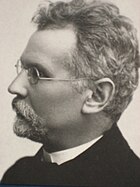 Bolesław Prus (1887) | |
| Author | Bolesław Prus |
|---|---|
| Original title | Faraon |
| Language | Polish |
| Genre | Historical novel |
| Publisher | Tygodnik Ilustrowany (Illustrated Weekly); Gebethner i Wolff (book) |
Publication date | 1895 (Illustrated Weekly); 1897 (book edition) |
| Publication place | Poland |
| Media type | Newspaper, hardback, paperback |
| Preceded by | The Outpost, The Doll, A Legend of Old Egypt, The New Woman |
Pharaoh (Polish: Faraon) is the fourth and last major novel by the Polish writer Bolesław Prus (1847–1912). Composed over a year's time in 1894–95, serialized in 1895–96, and published in book form in 1897, it was the sole historical novel by an author who had earlier disapproved of historical novels on the ground that they inevitably distort history.
Pharaoh has been described by Czesław Miłosz as a "novel on... mechanism[s] of state power and, as such, ... probably unique in world literature of the nineteenth century.... Prus, [in] selecting the reign of 'Pharaoh Ramses XIII' [a fictitious character][1] in the eleventh century BCE, sought a perspective that was detached from... pressures of [topicality] and censorship. Through his analysis of the dynamics of an ancient Egyptian society, he... suggest[s] an archetype of the struggle for power that goes on within any state."[2]
Pharaoh is set in the Egypt of 1087–85 BCE as that country experiences internal stresses and external threats that will culminate in the fall of its Twentieth Dynasty and New Kingdom. The young protagonist Ramses learns that those who would challenge the powers that be are vulnerable to co-option, seduction, subornation, defamation, intimidation and assassination. Perhaps the chief lesson, belatedly absorbed by Ramses as pharaoh, is the importance, to power, of knowledge.
Prus' vision of the fall of an ancient civilization derives some of its power from the author's keen awareness of the final demise of the Polish–Lithuanian Commonwealth in 1795, a century before the completion of the novel.
Preparatory to writing Pharaoh, Prus immersed himself in ancient Egyptian history, geography, customs, religion, art and writings. In the course of telling his story of power, personality, and the fates of nations, he produced a compelling literary depiction of life at every level of ancient Egyptian society. Further, he offers a vision of humankind as rich as Shakespeare's, ranging from the sublime to the quotidian, from the tragic to the comic.[3] The book is written in limpid prose and is imbued with poetry, leavened with humor, graced with moments of transcendent beauty.[4]
Pharaoh has been translated into twenty-three languages and adapted as a 1966 Polish feature film.[5] It is also known to have been Joseph Stalin's favorite book.[6]
From May 2024, a manuscript copy of the novel is presented at a permanent exhibition in the Palace of the Commonwealth in Warsaw.[7][8]
- ^ The last pharaoh of Egypt's Twentieth Dynasty and New Kingdom (and Egypt's last Ramesside pharaoh) was actually Ramses XI. Tyldesley, Joyce (26 April 2001). Ramesses: Egypt's Greatest Pharaoh. Penguin UK. p. 346. ISBN 9780141949789.
- ^ Czesław Miłosz, The History of Polish Literature, pp. 299–302
- ^ Zygmunt Szweykowski, Twórczość Bolesława Prusa, pp. 345–47.
- ^ Christopher Kasparek, "Prus' Pharaoh: the Creation of a Historical Novel," The Polish Review, 1994, no. 1, p. 49.
- ^ Christopher Kasparek, "Prus' Pharaoh and Curtin's Translation", The Polish Review, vol. XXXI, nos. 2-3, 1986, p. 129.
- ^ Christopher Kasparek, "Prus' Pharaoh and Curtin's Translation", p. 128.
- ^ "Palace of the Commonwealth open to visitors". National Library of Poland. 2024-05-28. Retrieved 2024-06-11.
- ^ Makowski, Tomasz; Sapała, Patryk, eds. (2024). The Palace of the Commonwealth. Three times opened. Treasures from the National Library of Poland at the Palace of the Commonwealth. Warsaw: National Library of Poland. p. 172.